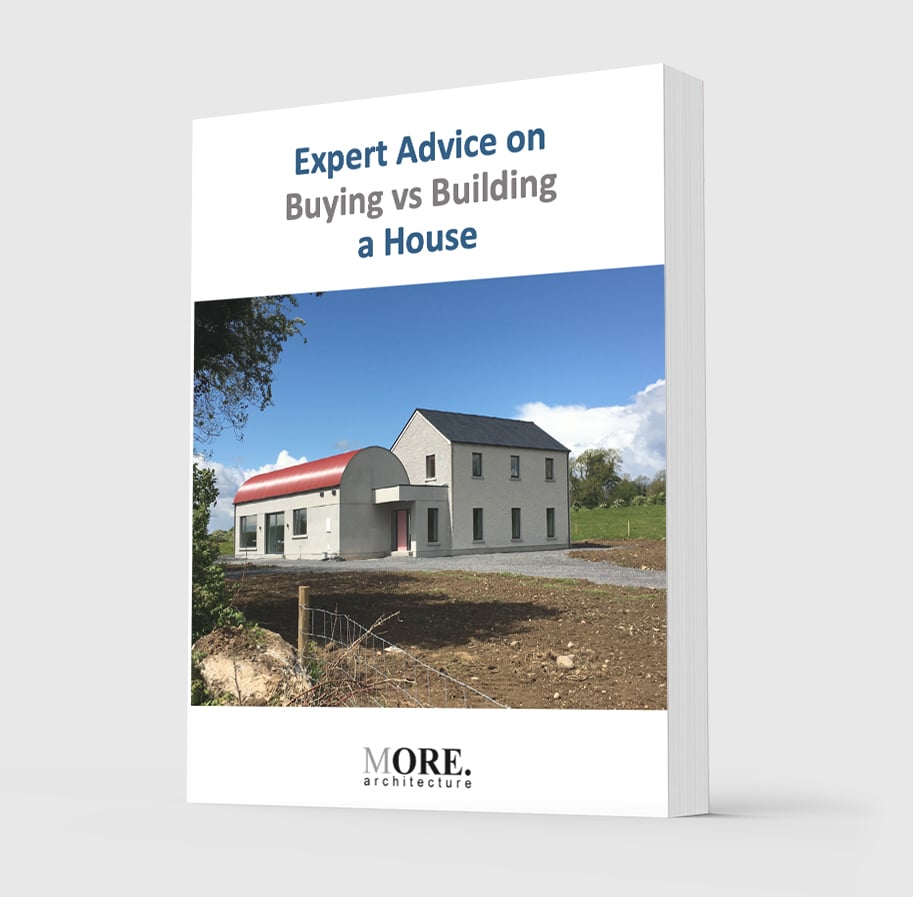- Do I need drawings for my extension or can I just tell the builder what to do?
You don’t necessarily need to have drawings drafted up for your project if it is a small job and or you have a skilled and really trusted person to do the work for you. When I say a small job I refer to jobs under 40 meters squared, extensions, boundary walls, fences, chimneys, paths and aerials.
Although saying that we really recommend you have drawings drafted up even if they are very basic. They don’t need to be drawn by an architect. If you have a trusted tradesperson who will do the work for you, it is important to communicate exactly what you want them to do and they can outline what they need to buy (materials) or build in order to provide you with your finished job. A simple set of drawings is the easiest way to achieve this.
You will avoid future headaches or rows with the tradesperson, which has been on many occasions, the driving wedge between family members falling out. Your trades person will be able to see exactly what you want and where you want it and he or she can plan the project fairly accurately and get back to you with a time and price for the job. At this point you could even get a second price from an alternative tradesperson to insure you are not being exploited.
If you don’t have a clue where to start with your project, if you don’t know any contractors or any professionals to produce drawings for you, please feel free to email us and we can advise you to what your next step should be and where you can find such professionals. It is important to note we value all our readers emails and strictly follow EU law to keep your email safe from spammers. We will not sell or give out your email to any third parties.
Our Recommendations
- Planning Permission can be expensive, do I need it?
You don’t necessarily need to have planning permission. For instance extensions to an existing building may be exempt from planning permission. Exemption is subject to a number of factors. I have outlined briefly the three main factors that will dictate if your project needs planning permission or not, they are as follows; the extension has to be less than 40 meters squared, the extensions roof can’t be higher than the existing roof and the extension can’t be built to the side or front of the house unless it is a small porch. It is important to understand that there are a lot more factors that will influence whether your project is exempt or not. You can find the exact requirements from your local authority’s planning section or you can click this link,
which is a link to Tipperary County Council’s requirements for exempt for planning permission. Don’t worry that it is Tipperary CoCo and not your local county council as the factors are almost identical across all the counties. There are some slight variations and most councils have the publication on their website for you to check out.
Here is a really easy way to check if you need planning permission, but please bare in mind that planning authority laws may differ. Simply answer these four questions;
- Is the building you wish to build going to the back of your existing house?
- Will the roof be the same height or lower than the roof of your existing house?
- Is the building you wish to build the first construction on your site since your last planning permission?
- Is the building you wish to build smaller that 40msq?
If you have answered Yes to all four of these questions, Congratulations, you don’t need planning permission.
If you have answered No to any of the above questions it is very likely you will need planning permission.
We have pulled together the 10 ten concerns most people have when they are thinking of building their dream house. We have taking the time to answer them based on our extensive experience and market statistics. We have also include a bonus question too. It is important to note we value all our readers emails and strictly follow EU law to keep your email safe from spammers. We will not sell or give out your email to any third parties.
Top 10 Concerns
- How much will planning permission cost?
If it turns of your project requires planning permission from your local authority then you will have to appoint an appropriate agent to put together the Planning Permission Application.
The Cost for the Planning Permission Application will vary from county to county and from agent to agent. There are a number of items that must be included with the application upon submission that are usually a fixed charge, such as OSi maps and Local Authority Application fees.
Some agents will calculate their fees by applying a price per square meter / foot to your projects floor area. Other agents will price based on their predictions of level of work and time it will take to obtain the Planning Application. You will find top end architects may give you a price based on the overall project costs, let’s say for instance 5% – 10%. There is nothing wrong with that, as a good architect is well worth the money in the long run. All I would say is, shop around to make sure you are not being exploited, but to also bare in mind, what an architect can do what no other professional out there can do no matter what anyone tells you. I’m speaking from experience now.
So depending on the local authority, the newspaper company, printing costs and the agent I would say for a simple 40 meter squared extension, the cost should between €1300 – €2000. This includes the cost of all items to be included in the application. You should ask your agent if the price includes these items too.
Please note if you want an architect or engineer to supervise the construction of the project the price will be significantly higher. The architect or engineer has to make a number of site visits over the duration of the build and produce extra drawings.
Wondering how much your project will cost to get planning permission? Feel free to email us with a few details or a basic project brief and a member of our technical team will give you an estimated price for you to think over. It is important to note we value all our readers emails and strictly follow EU law to keep your email safe from spammers. We will not sell or give out your email to any third parties.
Planning Cost Calculator
- How long does it take to get planning and start building my dream home?
“The Planning stage will take at least 18 Weeks”
There are a number of factors that will determine how long your project will take to be designed and ready for the construction phase to begin. However there are two time frames that are set in stone. The decision process by the local authority takes between five to eight weeks. Five being the minimum and eight being the max. It is very rare that you will get a decision before the full eight week term so best to allow two months for the planning permission decision to come back. In a lot of cases planners will look for more information to be added to the file, this in generally asked for after the eight week period. When your agent submits the further information the planner will then take another four weeks to make their decision. In some cases the planner will look for significant further information after this but in most cases the decision will be released.
The main factor for how long before you can start building will be the size of the project and how much involvement you have during the design process. Believe it or not clients tend to hold up their own job more than any other factor without even knowing it. This is due to changing their minds, thus changing drawings and indecisiveness. If you have a competent agent working on your behalf they should be able to clearly point out solutions to the cause of your headache at this stage.
Ok so lets say you want a 39 square meters extension to your house that requires planning permission. Your agent should take no longer than two weeks to produce the full Planning Application and have it ready for submitting to the local authority’s planning section. Something to bare in mind though is that you are not the only client your agent has and you might not be his or her top priority thus pushing the process out another couple of weeks or more even.
Allow eight weeks for the planners to make a decision, it’s best to allow the extra four weeks for further information and two weeks for your agent to prepared the documents for the further information request. We are now up to 16 weeks to the approval date of your project. You are then required to wait fourteen days before you can submit the construction commencement notice at a cost of €30 (may vary with authority) per house or extensions. Definitely make sure this is included in your agent’s services and price.
So thats a total of 18 weeks or 4.5 months from meeting your agent to having your contractor start the work on site.
Watch Out! With the introduction of new building control measures, a requirement what’s called BCMS, has to be submitted prior to construction for projects that are not exempt from planning permission. These new building control laws have passed on a large increase in costs to the client but insure a better quality build in the long run. This will increase time and money after your project gets granted with planning permission.
- My brother in law can do most of the work, is there anything I should be concerned about?
“Around 85,000 complaints are made about building work in homes each year (UK) according to the Office of Fair Trading.” – Gov.uk https://www.gov.uk/government/news/tighter-checks-to-keep-cowboy-builders-out
Yes and no, construction is quite simple. Someone who doesn’t know what they are doing or has very little experience will show their hand extremely fast. I understand there are cowboy builders out there but we are talking about your friend or relation.
The easiest thing to do if you want your brother in law or whomever to build your extension is to have a look at some of his previous work. I cannot recommend this enough. You will see right away if he is up to the task at hand.
If you are happy with the previous work and you have outlined what you want him to do and for how much, then go for it. Happy days.
If you can’t view their previous work or you know they have little experience I predict you will get what you pay for. You will end up spending a lot more on the long run and you definitely will have more grey hair by the end of it. Trust goes a long way in construction. If you can trust your architect to design you the best, most comfortable space for your budget and you can trust your building contractor to do all what he or she priced for, then you are in building heaven. Most people don’t trust their architects ideas and trust their builder, when usually the architect or designer is completely looking out for your needs while it’s the builder who will try to cut corners to save money because they underpriced the job in order to get it. This is a very cynical thought process but unfortunately a true one. I am aware I’m branding all with the same brush but I am just speaking from experience. I realise not all designs are saints and note all builders are sinners.
Again if you have a friend or relation that will act as the design agent for you, make sure you do your due diligence before signing a terms of engagement. Designing a healthy, comfortable living space is an art form and should not be left to someone who just knows how to use ‘Auto CAD’ or dabbles in a bit of drawing. Be sure your agent is a seasoned professional with a good portfolio.
Check out our 10 tips to spot a cowboy builder. It is important to note we value all our readers emails and strictly follow EU law to keep your email safe from spammers. We will not sell or give out your email to any third parties.
How to Spot a Cowboy Builder
- If I don’t go with my brother in law how do I ensure I don’t get some cowboy builder instead?
The most simple answer to this one is have a look at the builder’s previous work, or have a chat with one of their past clients. They won’t be slow to let you know the ups and downs they experienced with their own build. There are a lot of cowboy builders out there and it is very hard for a client to know any different so make sure you sit down with the builder before you sign the contract and just chat, get a feel for their character and previous experience. This will minimise the likelihood of contracting a cowboy to do a builder’s job.
Check out our 10 tips to spot a cowboy builder. It is important to note we value all our readers emails and strictly follow EU law to keep your email safe from spammers. We will not sell or give out your email to any third parties.
How to Spot a Cowboy Builder
- When tender prices come back, how do I know which is the best option contractor to go with?
Generally you or your agent will send out three tenders for contractors to price up. Usually the agent will have a contract he or she knows, trusts and worked with before. The agent will give that contractor the opportunity to price the job. If the price is coming in at a good rate you will most likely be getting a recommendation from you agent to go with that builder. This is a good thing as the agent doesn’t want to damage their own name and so will not recommend some dodgy builder to do the job. It will reflect bad on him or her.
If you decide not to go with the recommended building contractor most people will look at the three quotes and say, “well this one is too cheap for whatever reason, either they made a mistake or they will cut corners somewhere to save money. And this one is way too expensive. Why are they so expensive compared to to last one?” Sometimes contractors will price high because they don’t really want the job, or they may be too busy as it is. Or they have seen something on the drawings that could either take a lot of money to build and they are just allowing for that or they are dealing with an unknown, like existing walls or foundations work. In this scenario people tend to go with the middle priced quote, just to be safe. It’s a lazy way to pick your builder and I definitely don’t recommend it.
My solution is to meet all three builders and go over the drawings, budget and time frame. Bring your agent along with you too if you can. I can presume you are not foolish, you will have a good feel for what builder you should appoint after you meet them.
- Roughly how much will the construction cost?
€1100 per meter squared is the average price” – Bruce Shaw surveyors have the largest Irish database of building surveys.
Strictly speaking the cost of construction is almost impossible to accurately predict. That is why there is always a contingency sum set aside for unforeseen expenses. This is why it is really important to have an experienced designer and contractor on board that have the ability to predict any costly issues that may crop up. Also for bigger jobs, a quantity surveyor is a big help at assigning sums of money to the different construction phases on your behalf. This will keep the budget tight and reduce any extra worries on you.
So using Bruce Shaw’s average price per meter squared we can get an approximation for your building cost by simply multiplying your projects floor area by €1100. So taking our 39 square meter extension the construction will cost €42,900. This is just an approximation, there are ways to reduce this cost but unfortunately there are factors that could dramatically increase this figure too.
Self build magazine have a great article on building costs in Ireland if you want to have a read of it click the link;
http://selfbuild.ie/construction/build-cost-estimator/
Save thousands of euro when building your dream home by following our Lean Construction Guide . It is important to note we value all our readers emails and strictly follow EU law to keep your email safe from spammers. We will not sell or give out your email to any third parties.
Lean Construction Guide
- Which hardware gives the best prices for the materials?
The Price of Materials rose this year by 1.4% on average – CSO Wholesale Price Index
There is no definitive answer to this question. The cost of materials have been increasing in recent years across the board. Prices vary from building providers to building providers. Getting the best price for the building materials is an extremely tedious job and is not for the faint hearted. If you are organising the materials you will soon find out that you will have to get different materials from many different providers and manufacturers and without experience how do you know you are getting the best materials for your project.
You can have a look at how material prices in Ireland have been on the increase over the last couple years on the Central Statistics Office website or click this link;
http://www.cso.ie/en/releasesandpublications/er/wpi/wholesalepriceindexjanuary2016/
I would suggest you specify that the building contractor prices for the materials and supplies them. A lot of the time contractors have existing and good relationships with their favourite building providers and they may get a better price for the materials than a general punter of the street would get. Saying that the contractor may add a percentage to the materials to cover his delivery fee and time but at least you know the contractor will get the right materials for the job at hand.
You should have been given a bill of quantities at the start of the job so you know what is being allocated to each element of the construction phase, you just won’t know exactly what it cost to purchase the materials. To be honest you’re better off not knowing, it will save you many headaches.
- What building regulations does my development need to meet?
It depends on the type of project you want to build and who your local authority is, but if it’s a domestic building you will be obliged to build to the latest Technical Guidance Documents provided by the Department of Environment, Community and Local Government.
Here is the link to all the latest publications;
If you have a design agent and contractor this won’t be an issue. You can specify to your design in the design stage how efficient you want your building to be. They will advise you after that.
As a rule, designers will want to over specify the construction build ups and the building contractor will want to under specify. You need to lean towards what you are happy with, and what you will be happy with in twenty years time when these professionals are long gone and you’re still living in the building.
You may have heard things like loads of insulation in the roof and walls for example, and yes this is good but what you really need is a well sealed house. Drafts are the main cause of being uncomfortable in a room and result in huge levels of heat loss.
If you would like to see the best option for your building, that is proven to be the best fit for houses and extension then check out our Hybrid House Design. It is important to note we value all our readers emails and strictly follow EU law to keep your email safe from spammers. We will not sell or give out your email to any third parties.












